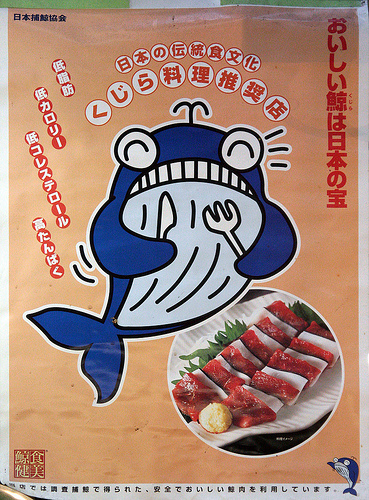Japan revives commercial slaughter
 Japan has dropped the façade of ‘research’ and is now whaling for purely commercial purposes.
Japan has dropped the façade of ‘research’ and is now whaling for purely commercial purposes.
Japan’s floating whale meat factory ‘Nisshin Maru’ has had the word ‘research’ scrubbed from its hull, and has joined the resumption of commercial whale hunting.
Japan last year quit the International Whaling Commission - which protects global whale populations – meaning it has to give up its false ‘scientific whaling program’, but can return to hunting whales in Japanese waters only.
Studies by Japan’s Institute of Cetacean Research have included killing whales all the way through their migratory path (including in breeding grounds) to see how they feed and grow. Other projects involved slaughtering whales in order to establish baseline figures on how many can be slaughtered.
The fake research program saw the deaths of hundreds of whales each year.
Japan's former chief IWC negotiator Masayuki Komatsu says giving up the Southern Ocean whaling program was a “stupid” decision.
“We should go because it's a common property of the ocean,” Mr Komatsu said.
“The more Australia claims that it is their own territory and their own oceans, the more that Japan [should keep going] because Australia is a minority.
“Japan and the US and other nations — China and Russia — we are a majority.”
Japan has only one offshore whaling company - Kyodo Senpaku.
Company spokesperson Konomu Kubo says not having to pretend to do science could result in tastier meat.
“Until now research was the main object and after they caught a whale, they had to first take samples and measure it on the vessel and processed the meat later and it took a little time,” he said.
“We can prioritise the quality now. We will process the meat so it retains its quality and do the bare minimum of research.”
While the Japanese Government insists it needs to maintain the whaling industry – which directly employs just 300 people – annual demand has been stuck for a decade at just 40 grams per person.
The Government says that if Japan stops whaling, it may also be made to stop fishing for other foods like tuna.
“It's a matter of principle. There are plenty of resources. Once you do it, you would be considered as a country who would easily give up,” Mr Komatsu said.
Prime Minister Scott Morrison reportedly did not mention whaling when we met his Japanese counterpart Mr Abe during the G20 Summit in Osaka, saying the Japanese appeared to be aware of Australia's objections.
“I welcome the fact that they are not doing anything in the Southern Ocean now, that is a welcome development. I am not going to allow our relationship with Japan to be defined by this issue,” he said.








 Print
Print